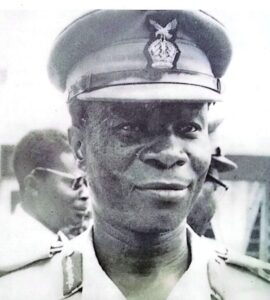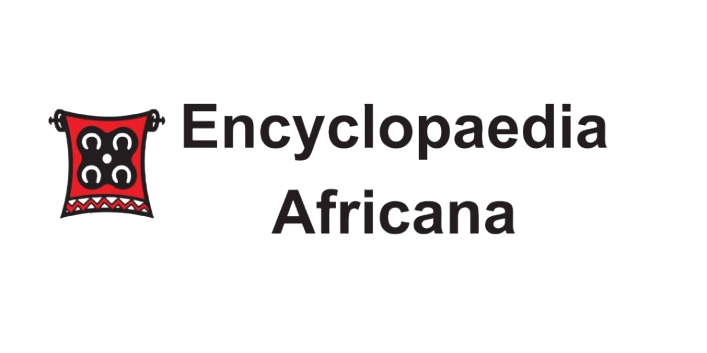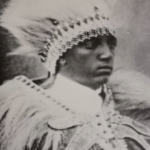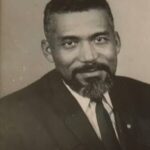KOTOKA, EMMANUEL KWASI
- 6 Min Read
Lieutenant-General Emmanuel Kwasi Kotoka (October 26, 1926 – April 17, 1967) was the soldier who led the coup which overthrew the administration of President Kwame Nkrumah of Ghana on February 24, 1966.

PHOTO CAPTION: Lieutenant General Emmauel Kwasi Kotoka. SOURCE: EA Library
He was born in 1926 in Alakple, near Keta, in the Volta Region, and was educated at Alakple Roman Catholic school, and at Anloga senior school in the same vicinity. Thereafter he trained as a Catholic teacher-catechist. In 1941 he began to teach, continuing for nine months before leaving in 1942 to train as a goldsmith.
He qualified as a goldsmith in January 1947, but had to abandon his craft for financial reasons. He enlisted in the Gold Coast Regiment on July 18, 1947 as a private at the Infantry School at Teshie, 10 mi (16 km) east-north-east of Accra, where he trained illiterate recruits. Promotion came quickly. By 1948 he was a sergeant, and by 1951 a company sergeant-major.
In 1952 Kotoka and A. K. Ocran, with whom he was later associated in staging the 1966 coup, were among some West Africans, selected to take a course at Eaton hall, Chester in England. He was commissioned lieutenant in November 1954, and was seconded to the British army on the Rhine. He returned to Gold Coast in early 1955, and became the platoon commander of the second Gold Coast Regiment of Infantry. He was appointed second in command in 1958, and became company commander in 1959 with the rank of captain, and the temporary rank of major. In 1960, he attended a company commanders’ course at the school of Infantry in Warminster, Wiltshire, England.
On his return, Kotoka went to the Congo-Leopoldville (now The Democratic Republic of the Congo), with the second Battalion of the Ghana Army as part of the United Nations Emergency Force (U.N.E.F), which had been sent there at the request of the Congolese government to maintain order in the period of confusion which followed the achievement of Congolese independence on June 30, 1960. Kotoka commanded the company of the battalion, which guarded the radio station at the capital city of Leopoldville (now Kinshasa) during the power struggle between Patrice Lumumba, the Congo’s first premier, and Joseph Kasavubu, the country’s first president, and showed great bravery and tact in difficult circumstances. He served two terms of duty in Congo, and was promoted to major after his second term.
In early 1961 he became deputy assistant adjutant and quartermaster-general, and in September of the same year was promoted commander of the second battalion with the temporary rank of lieutenant colonel. In 1962 he was sent to the Congolese province of Katanga (formerly Shaba) which, under the leadership of its provincial president, Moise Tshombe, and with the support of foreign mining interests, was attempting to secede. Kotoka distinguished himself during the operations at the military air base at Kamina, some 300 mi (480 km) northwest of the provincial capital of Elisabethville (now Lubumbashi), and was awarded the Ghana Service Order for exceptional bravery in 1963.
When he returned home, politics had entered the Ghana army. The bomb attempt on President Nkrumah’s life at Kulugungu (Kulungugu) in northern Ghana in 1962 had led to the formation of a Soviet-trained elite corps called the President’s Own Guard Regiment. Kotoka was appointed quartermaster-general of the Ghana army, and had to deal with the problems created by the establishment of this regiment. Specifically, he opposed the proposal to transform the President’s Own Guard Regiment into a field regiment because he regarded this as a contravention of military procedure.
He came to think that if Nkrumah was allowed to have his way, the army would become the tool of politicians. Various people, independently of one another, had thought of staging coups. Among them were Major Akwasi Amankwa Afrifa and John Willie Kofi Harlley. When Harlley became commissioner of police in 1964, he disclosed his intention to Kotoka, who promised cooperation. But they could not stage the coup in 1965 because they were unable to obtain the cooperation of the chief of staff, Major-General Otu. Also failing to enlist support from other senior officers, Kotoka decided to rely on more junior ones. When he was transferred to Kumasi in 1965 to command the First Brigade of Infantry, he maintained contact with Harlley in Accra. In January 1966, while preparing plans for the coup, he found that he could rely on Afrifa, his brigade major, and ordered him to prepare the operational plans. Since Nkrumah had proclaimed that he would send Ghanaian soldiers to Rhodesia to overthrow the white minority government of Ian Smith there, Kotoka used the state of preparedness that had been ordered as a pretext for staging manoeuvers on the Accra plains in the south in January 1966, thus escaping Nkrumah’s tight security network. To avoid unnecessary bloodshed, the plotters decided that the coup should be staged after Nkrumah had left Ghana on a peace mission flying to Hanoi, North Vietnam, and fixed February 24 as the date for the operation.
For the operation’s success, Kotoka needed the cooperation of the commander of the First Infantry Brigade in Accra, Colonel Ocran. He finally managed to meet him secretly and Ocran agreed to cooperate.
The coup, the code name of which was “Operation Cold Chop”, began as planned on February 24 at 6am. Kotoka went to Broadcasting House, which had been captured by Major Afrifa, and announced the takeover of the government by the army and police, the dismissal of Nkrumah and the suspension of the constitution. There was fighting at Flagstaff House, Nkrumah’s official residence, but by midday it had ended and the President’s own Guard had surrendered. The coup was greeted with wild enthusiasm in Accra and elsewhere, and overnight Kotoka, previously an obscure soldier, became famous. An eight-man National Liberation Council (N.L.C) was formed to take over the executive duties of the President, with Kotoka as one of its members. He was promoted major-general, and became the general officer commanding the Ghana Armed Forces.
He earnestly wanted to eradicate corruption and reform the administration of the state, and was determined that the leaders of the Convention People’s Party (C.P.P), the previous party in power, should be disqualified from holding public office. He served as minister of health for an interval but did not feel that he could do a civilian’s job and spent more time on the reorganisation of the army. Meanwhile plots were being hatched by supporters of Nkrumah to overthrow the N.L.C. but Kotoka disregarded the warnings.
The first anniversary of the February 24 coup was celebrated with pomp, and Kotoka was the idol of the crowd. Then, on April 17, 1967, the plotters struck. Although their attempted coup was unsuccessful, Kotoka was captured and killed by one of the plotters, Lieutenant Moses Yeboah, after fighting had taken place at Accra Airport. The country was plunged into mourning, there were wholesale arrests of Nkrumah supporters, and men and women from all walks of life attended Kotoka’s funeral.
A Kotoka trust fund was opened and was oversubscribed. The Accra international airport opened in 1969, was named after Kotoka, and a statue erected at the spot where he fell.
L.H.OFOSU-APPIAH




